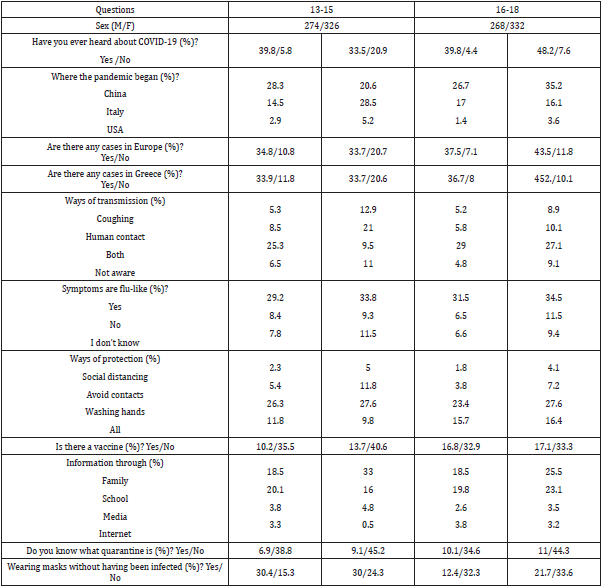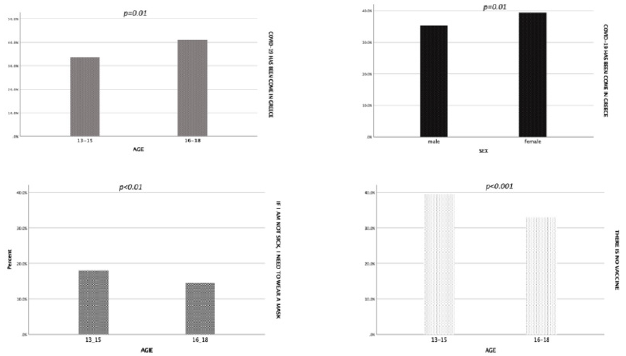Abstract
Background: Social distancing has been adopted for reducing the outbreak of the
evolving pandemic of coronavirus disease 2019 (COVID-19). Among other measures
to protect the public, closure of schools has been applied. However, messaging is not
always consistent and clear.
Methods: To determine COVID-19 awareness among Greek adolescents, who
easily transmit the SARS-CoV-2 during school reopening the self-reported knowledge
and behavior have been recorded.
Results: Most of participants were aware about coronavirus and its origin. Nearly
one fifth could not correctly identify symptoms (19%) while only one third agreed about
the ways of protection. Interestingly, 85% have received their information through
school and family. Only 18,5% of the participants knew what quarantine is. Regarding
the existence of an effective vaccine, 27,5% replied positively. In multivariable analysis,
male subjects were more aware that COVID-19 has been come to Greece.
Conclusions: The level of information about COVID-19 among Greek students was
found to be satisfactory, but not ideal. These findings, along with the potential for a
second wave of a COVID-19 pandemic, highlight the need for a more intensive health
education program in Greek schools, in order to deal with this serious public health
problem.
Keywords: Mitochondrial Respiration; Neurons; Cerebral Ischemia
Introduction
Severe acute respiratory syndrome due to coronavirus 2 (SARSCoV- 2) and the resultant coronavirus disease 2019 (COVID-19) has raised worldwide health concern since December 2019. As of March 11th, 2020, the World Health Organization (WHO) characterized it as a pandemic [1]. Governments all over the world have taken actions to minimize the risk of infection and the spread of the virus [2]. In the context of the social distancing strategies, schools, universities and colleges have closed, in a nationwide or local basis in 190 countries, affecting approximately 73.5% of the world’s student population [3]. Being on the same wavelength, and based on evidence and assumptions from influenza outbreaks that school closures reduce social contacts between students and therefore interrupt transmission, the Greek authorities took the decision to also implement this measure [4]. However, as Greece was highlighted among the countries with the less cases and victims from COVID-19, this measure was taken back and the schools were reopened for the last class of high school in May 4th and one week later for secondary and the rest of the classes of high school. This descriptive study aimed to determine the level of information about the COVID-19 among students of Athens, aged 13 to 18 years. More specifically, we attempted to assess the level of knowledge, as well as their preparedness and ability to react efficiently during the pandemic.
Methods
Study Design and Sample
The study was conducted in schools of Athens Area, with a total population of 3,74 million people. The study was approved by the Hospital ethics committee and executed in accordance with the Declaration of Helsinki (1989). Inclusion criteria were voluntary involvement of students living in the Attika area. Common exclusion criteria include the presence of a severe and uncorrectable cognitive, visual, or hearing impairment that would preclude a participant’s ability to complete interviews. Participants were not required to record their personal details, nor to answer all questions in the questionnaire. Data were collected from 13 through 20 March 2020. Surveys took less than 10 minutes. In total, 1200 students aged 13 to 18 years were selected, sub-divided in two groups, 13-15 years old and 16-18years old, respectively
Questionnaire
Survey items were adapted from questionnaires used to study prior outbreaks [5,6]. The questionnaire consisted of 12 items (9 dichotomous questions, and 3 multiple choice) designed to assess students’ knowledge of SARS-CoV-2 characteristics, for example: What is COVID-19? How is COVID-19 transmitted? Which are the symptoms and the protection measures? What is the quarantine? Is there a vaccine? Has there ever been a COVID-19 case in Greece?
Statistical Analysis
Categorical variables were presented as a percentile. Descriptive statistics were calculated for all participant characteristics and survey responses and were presented as valid percentages and as numerical values were appropriate. The chi square test was used to determine statistically significant differences among subgroups of the study’s participants. A p value <0.05 was considered as statistically significant. SPSS 24 for Windows (SPSS 23 Armonk, NY: IBM Corp) was used for the analysis.
Results
General Knowledge about SARS-CoV2
From the total group of 1,200 teenagers aged between 13 and 18 years, 658 (54,8%) were female. Among the participants, 1,044 (87%) knew what the coronavirus is, and 744 (62%) were aware that the outbreak began from China. When the survey was conducted, the virus had spread to all regions of Italy, while on March 12th the first victim was reported in Greece. Therefore, when participants were asked if the virus had infected people in Europe and Greece, 79,5% and 74,7% respectively, answered positively. Interestingly, most of the responders (85%) were informed by their families or teachers; only 180 of the students (15%) said that the source of their information about COVID-19 was media and the web.
Symptoms and Transmission of Covid-19
Study participants were asked about the symptoms of COVID-19; 774 (64,5%) said the symptoms are similar to those of a common cold-like illness, while 198 (16%) were unaware. Regarding the ways of transmission 54,1% of them answered through coughing and human contact while 15,9% of them were not aware. On average one third of responders (30,5%) claimed that there is no need for an urgent visit at the hospital if someone is suspected to be infected by the SARS-CoV-2.
Awareness of Ways of Protection
The study aimed to determine how informed students were about protection measures. Of note, only 66 (5,5%) and 138 (11,5%) recognized the social distancing and avoidance of contacts as effective precaution measures, respectively. More than half of them (53%) answered that hand washing should be followed. Interestingly, nearly one third agreed that all the above-mentioned measures should be applied by general population to avoid the spread of the disease. Furthermore, only 222 (18,5%) of the participants knew what quarantine is; 390 (32,5%) claimed that there is no need for a mask if the person is not infected. Regarding whether an effective vaccine exists, 330 (27,5%) reported falsely that a vaccine already exists. (Table 1) summarizes respondents’ estimations according to their age group.
Data Stratified According to Sex or Age
After multivariable adjustment, male subjects were more aware that COVID-19 has been come to Greece (78% vs. 71%, p=0.01). Older students were more aware that COVID-19 has come to Greece compared to younger ones (82% vs. 67%, p=0.01), while they were also aware that if they are suspected of having the disease there is no need to go immediately to hospital (73% vs. 66%, p=0.01). Nevertheless, the younger compared to older students were more informed that no vaccine exists (79% vs. 66%, p<0.001) and that the mask should be applied even if the person has not the disease (36% vs. 29%, p<0.01) (Figure 1).
Discussion
In a survey of more than 1,200 sociodemographically diverse
teenagers, we found that most respondents perceived that they
have heard of the coronavirus (COVID-19). However, many are not
properly aware about the symptoms and the ways of protection;
the one forth could not identify symptoms and almost the one
third were totally informed about the proper prevention measures.
Another critical point is the use of mask by healthy individuals as
two thirds answered that is not necessary. That facts may reflect the
blurred image given by the experts regarding the use of the mask.
In our study, disparities by sex and age were presented. During
the pandemic, Greece managed to react early and effectively. The
number of the cases (2,892) and the victims (173) rank Greece in
78th position [7]; international mass media praise Greece’s handling
of outbreak as a surprising success story. As a consequence, from
the beginning of May, most activities gradually return to normal,
employees go back to work, various public restrictions ceased, bar
and restaurant reopened. Whilst pandemic globally exists, Greek
government outweighing the benefits for children’s education and
mental health, decided to reopen schools in 7th September. Several
studies of COVID-19 hint that children are less likely to catch the
novel coronavirus, and they don’t often transmit it to others [8,9].
Relying on those encouraging data and the reassuring knowledge
that very few children get severely ill from COVID-19 other
governments, amongst then Denmark, Germany and Israel have
already reopened schools.
The measures are tentative as most schools are resuming with
reduced class sizes, shortened school days, and extra handwashing,
while spots, which outbid about social distancing are flooding the
media. However, some scientists worry about the risks, as even if the
possibilities of transmission are low, the web of contacts makes the
tracking process difficult. Our study, working to quickly capture the
opportunity to investigate the level of awareness in teenagers, has
clear limitations. First, the survey was conducted among a selected
group of students only in the Attika region. Therefore, there is no
knowledge how semi-urban and rural areas are informed regarding
coronavirus. However, our study samples purposefully include girls
and boys from schools socioeconomically diverse. Prior research
on virus outbreaks guided our selection and creation of survey
items [5,6]. However, items followed best practices for the design
of assessments for use among persons with lower literacy [10].
Third, our outcomes capture only initial awareness of COVID-19,
fundamental knowledge, attitudes, and a limited set of behaviors.
However, understanding of the virus has since quiete evolved, and
we could not expand on those developments. Items included in
planned follow-up waves of the survey will adapt accordingly.
Finally, public health messages about new policies and
restrictions dramatically change day to day. Regardless, our findings
depict the initial lack of clarity in understanding and perceived
susceptibility, among teenagers regarding pandemic. Bearing in
mind our findings, actions and cooperation are needed amongst
local authorities, health boards, trade unions, public health, disease control experts, and schools, to ensure that as long as the pandemic
exists, all teenagers are adequately made aware of the gravity of
the threat.
Conclusion
The level of information about COVID-19 among Greek students aged 13 to 18 years was found to be not ideal but adequate. Although the students were found informed on some aspects, they were unfamiliar with other important issues. In the light of a potential second wave of COVID-19 pandemic, our findings highlight the need for intensified health education programs in Greek schools in order to deal with this serious emerging health problem.
Conflict of Interest
None.
Acknowledgment
None.
Funding
None.
References
- (2020) WHO. WHO Director-General’s opening remarks at the Mission briefing on COVID-19.
- (2020) Worldometer. COVID-19 coronavirus outbreak.
- (2020) UNESCO. COVID-19 Educational Disruption and Response. UNESCO.
- Jackson C, Vynnycky E, Mangtani P (2016) The Relationship Between School Holidays and Transmission of Influenza in England and Wales. American journal of epidemiology 184(9): 644-651.
- Marinos G, Vasileiou I, Katsargyris A, Klonaris C, Georgiou C, et al. (2007) Assessing the level of awareness of avian influenza among Greek students. Rural and remote health 7(3): 739.
- Kelly B, Squiers L, Bann C, Stine A, Hansen H, et al. (2015) Perceptions and plans for prevention of Ebola: Results from a national survey. BMC public health 15: 1136.
- 2020.
- Wise J (2020) Covid-19: Delaying school reopening by two weeks would halve risks to children, says iSAGE. BMJ 369: m2079.
- Ioannidis JPA (2020) Coronavirus disease 2019: The harms of exaggerated information and non-evidence-based measures. European journal of clinical investigation 50(4): e13223.
- Shoemaker SJ, Wolf MS, Brach C (2014) Development of the Patient Education Materials Assessment Tool (PEMAT): A new measure of understandability and action ability for print and audiovisual patient information. Patient education and counseling 96(3): 395-403.

 Research Article
Research Article

